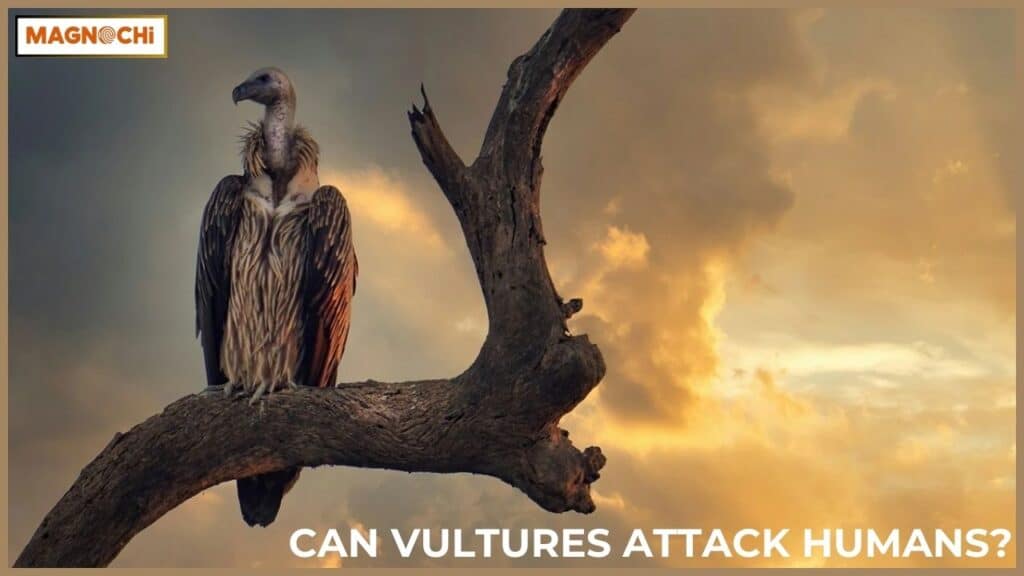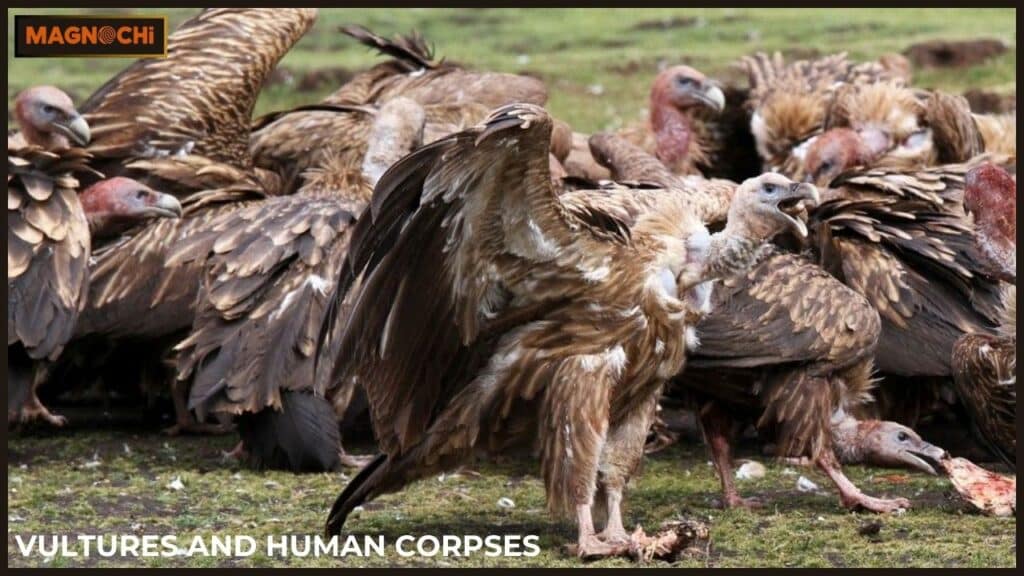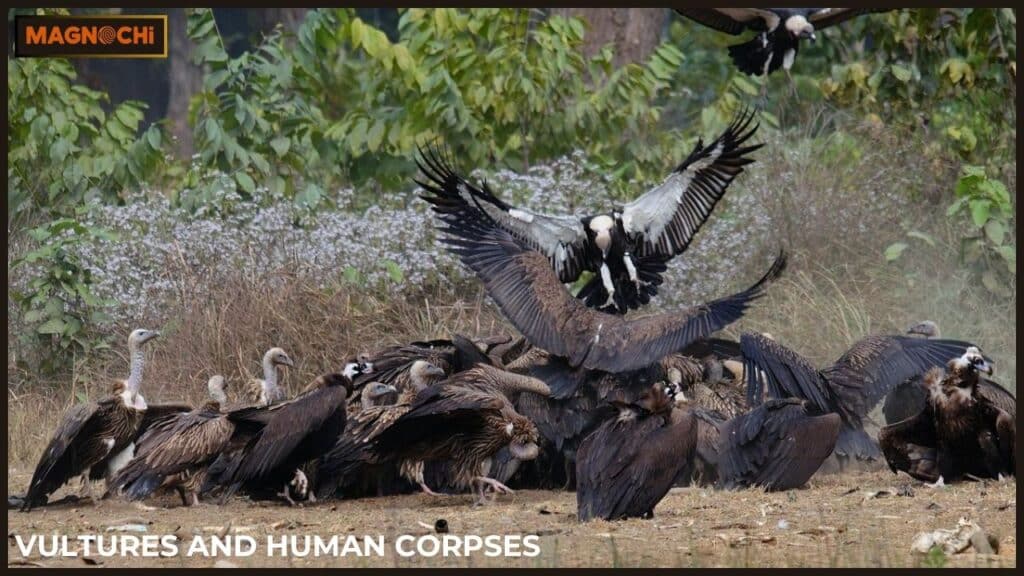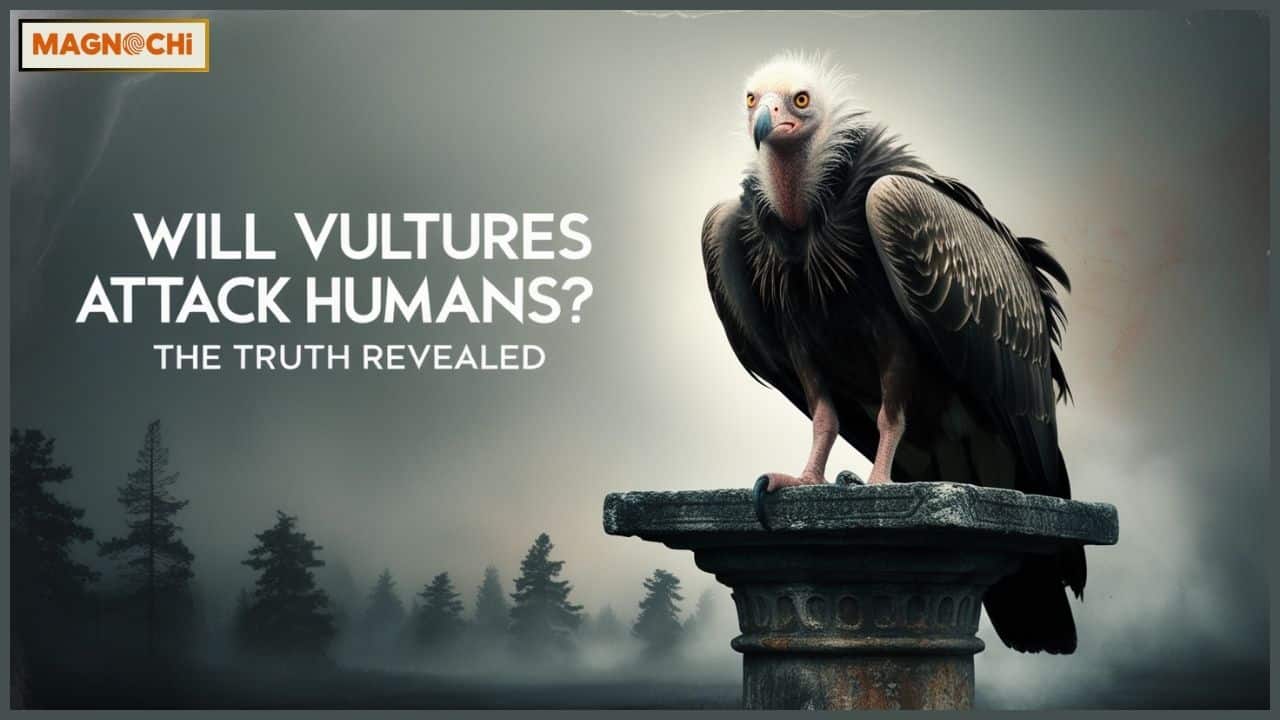Will Vultures Attack Humans? Vultures are birds that have intrigued and often frightened humanity for centuries. Known for their scavenging ways, their presence near carcasses, and their unmistakable flight patterns, vultures often spark curiosity, awe, and sometimes fear.
Many people are puzzled by their behavior, and a significant number of myths and misconceptions exist about vultures attacking humans.
In this article, we will delve deep into the question: Will vultures attack humans? and explore the true nature of these misunderstood creatures, shedding light on their behavior, their ecological role, and why they pose no threat to humans.
Who Are Vultures?
Vultures are large birds that primarily feast on carrion dead animals. These birds play a vital role in their ecosystems by cleaning up animal remains and preventing the spread of disease.
Despite their often eerie reputation due to their association with death, vultures are non-aggressive creatures. They are natural scavengers who contribute greatly to maintaining the health of our environment. [Will Vultures Attack Humans?]
There are two main groups of vultures:
- New World Vultures: Found primarily in the Americas, these vultures include species like the Turkey Vulture and Black Vulture. They are part of the Cathartidae family and are known for their keen sense of smell, which helps them locate carrion over vast distances.
- Old World Vultures: These vultures are found across Europe, Asia, and Africa and are members of the Accipitridae family, which also includes hawks and eagles. Examples include the Griffon Vulture and the Egyptian Vulture. These vultures rely on their excellent eyesight to spot carcasses from high altitudes.
Although they belong to different families, New World and Old World vultures share a similar role in ecosystems and have some physical characteristics in common, such as their large wingspans and bald heads.
Vultures’ Diet and Feeding Habits: Nature’s Clean-Up Crew
Vultures are one of nature’s most efficient scavengers, feeding almost exclusively on dead animals or carrion. Their diet primarily consists of decomposing flesh, but they will also feed on bones and sometimes even the contents of the stomachs of larger animals.
Finding Food: How Vultures Locate Carrion
Vultures are masters at locating food in the wild. The methods they use depend on whether they are New World or Old World vultures.
- New World Vultures: These vultures possess an extraordinary sense of smell, making them unique among birds of prey. They can detect the scent of decaying flesh from miles away. The Turkey Vulture, for example, can detect the chemical compounds released by decaying animal bodies, which helps them pinpoint potential food sources from high in the sky.
- Old World Vultures: Unlike their New World counterparts, Old World vultures rely primarily on their keen eyesight to locate food. From altitudes of up to 10,000 feet, these vultures can spot a carcass from miles away. They have adapted to living in open, expansive landscapes like savannahs and grasslands, where they can scan vast areas for food.
Feeding Mechanisms: How Vultures Consume Their Food
Once vultures have located a carcass, they swoop down to feed. Their feeding techniques are perfectly suited for scavenging. Here are some key adaptations:
- Flesh-tearing beaks: Vultures have powerful beaks designed for tearing into tough skin and muscle. These beaks allow them to consume meat efficiently, even from large animals.
- Gizzard: Vultures possess a gizzard, a muscular part of the stomach that helps break down tough materials like bones. This adaptation is crucial for vultures to extract as much nutrition as possible from their meals.
- Regurgitation: Vultures are known to regurgitate food when threatened. This behavior helps them lighten their bodies and quickly take flight if necessary. It also serves as a defense mechanism by making them less attractive to potential predators.
Vultures typically feed in groups, with the first vulture to arrive at a carcass being joined by others. This behavior helps ensure that the carcass is consumed efficiently before it starts to decay too much. [Will Vultures Attack Humans?]
Can Vultures Attack Humans? Understanding the Myth
One of the most common myths surrounding vultures is the idea that they can attack humans. This misconception likely arises from their association with death, their large size, and their habit of hovering around carcasses, which often leads people to believe they might be dangerous. However, the truth is very different.

Physical Capabilities of Vultures
Vultures are not built for hunting or attacking prey. Their talons are relatively weak compared to those of other birds of prey like hawks or eagles.
Their beaks, while sharp and capable of tearing through flesh, are not designed for attacking living creatures. In fact, vultures lack the physical capability to pose a serious threat to humans.
Some vultures, such as the Black Vulture, may display more assertive behavior around their food, but they are still not capable of attacking large animals or humans. [Will Vultures Attack Humans?]
These birds are opportunistic feeders that focus on scavenging carrion, not engaging in combat.
Behavioral Tendencies: Are Vultures Aggressive?
In terms of behavior, vultures are generally very cautious around humans. They are not territorial, and they do not seek out confrontations.
If a human approaches too closely, a vulture is far more likely to fly away than to engage in any sort of attack. These birds have evolved to avoid threats, and their primary defense mechanism is to flee rather than fight. [Will Vultures Attack Humans?]
While vultures do have a natural wariness of humans, they are not aggressive animals. They do not see humans as threats unless provoked, and they are more likely to avoid humans altogether.
Why Vultures Do Not Attack Humans: Debunking the Myths
The notion that vultures might attack humans has been perpetuated by cultural representations, historical myths, and the birds’ association with death.
However, the truth is that vultures are not aggressive creatures and are unlikely to pose any danger to humans. Let’s address the common myths and misconceptions:
Myth 1: Vultures Are Dangerous to Humans
Reality: Vultures are not predators. Their primary focus is feeding on dead animals, not attacking living creatures. Vultures lack the physical tools, such as sharp talons or powerful beaks, needed to hunt or harm humans. They are not dangerous unless directly threatened.
Myth 2: Vultures Will Attack Small Children or Pets
Reality: While some people might fear vultures attacking small animals or children, this is simply not the case. Vultures are not interested in attacking live creatures. Their primary food source is carrion, and they have no reason to hunt pets or children.
Myth 3: Vultures Will Scavenge on Human Corpses
Reality: While vultures may occasionally feed on human remains, this is extremely rare. Sky burials, a practice common in Tibetan Buddhism, involve using vultures to dispose of human bodies, but this is a cultural practice and does not indicate that vultures actively seek out human corpses.
Instances of Human Interaction: How Vultures Behave Around Humans
While vultures are non-aggressive, there are still instances where humans may come into contact with them. Here are a few examples of human-vulture interactions:
Vultures in Urban Areas
Vultures are increasingly being spotted in urban areas, especially near food sources like roadkill or garbage dumps. [Will Vultures Attack Humans?]
In these settings, vultures may become more accustomed to human presence, but they still tend to avoid direct interaction with people. It is rare for vultures to engage with humans unless they feel threatened.
Vultures and Roadkill
Vultures often feed on roadkill in rural or suburban areas. In some cases, they might be seen perched on roadsides or landing near busy roads to scavenge.
While this can cause concern for people, vultures are simply following their instincts to find food. It’s important to remember that vultures are not targeting humans but are instead focused on dead animals.
Vultures and Human Corpses: The Role of Vultures in Sky Burials
Vultures are occasionally associated with human remains, but it is important to understand the cultural and ecological context of these interactions. Sky burials are a ritual practiced in Tibetan Buddhism, where vultures are used to dispose of human bodies.

While this practice may seem unsettling to some, it is a natural and respectful way to return the body to nature. [Will Vultures Attack Humans?]
Do Vultures Eat Human Corpses?
Although it is rare, vultures may feed on human remains in certain circumstances. However, this is not something that vultures actively seek out.
When human bodies are placed in open areas, vultures may feed on them as part of their normal scavenging behavior. But this is a natural occurrence rather than an aggressive action by the vultures.
The Cultural Significance of Vultures
Vultures have been a part of human culture for centuries, and they are often seen as symbols of death, rebirth, and renewal. In many cultures, vultures are revered for their role in cleaning up the environment and returning nutrients to the soil.
Harbingers of Doom
Vultures have long been associated with death in various cultures. Their presence near battlefields, where they would feast on the bodies of the fallen, led to their portrayal as harbingers of doom. However, this symbolism is more about their ecological role than any intent to bring harm to humans.
Vultures in Religion and Spirituality
In some cultures, vultures have spiritual significance. In Tibetan Buddhism, vultures are viewed as sacred animals that help dispose of human bodies during sky burials, symbolizing the return of the deceased to the earth. This practice underscores the idea of vultures as part of the natural cycle of life and death.
Vultures’ Ecological Importance: Why Vultures Matter
Vultures are crucial players in their ecosystems. As scavengers, they help break down decaying animal bodies, preventing the spread of disease. By consuming carcasses, vultures also recycle nutrients back into the environment, enriching the soil and supporting plant life.

Disease Prevention
Vultures play a vital role in disease control. By consuming decaying carcasses, they help prevent the spread of pathogens such as anthrax, rabies, and botulism, which can thrive in decomposing bodies.
Without vultures, these diseases could spread more rapidly through the ecosystem, affecting other animals and potentially humans. [Will Vultures Attack Humans?]
The Benefits of Vultures to Humans
Vultures are often overlooked in the discussion of wildlife conservation, but they provide several essential benefits to humans.
Not only do they help control disease, but they also play a role in maintaining the balance of ecosystems by consuming dead animals.
This reduces the need for landfills or other waste disposal methods and helps maintain the health of the environment.
Vultures’ Defense Mechanisms: How They Protect Themselves
Vultures are not only skilled at scavenging but are also adept at defending themselves against threats. When faced with danger, vultures have several strategies to ensure their survival:
Vomiting as Defense
One of the most unusual defense mechanisms employed by vultures is vomiting. When threatened, vultures may regurgitate their stomach contents as a way to lighten their bodies for flight.
This also serves to deter predators, as the vomit has a foul smell that makes the vulture less appealing to potential threats. [Will Vultures Attack Humans?]
Fleeing the Scene
Vultures are not confrontational. Their primary defense mechanism is to flee from danger. Their powerful wings enable them to take off quickly, and they often prefer to escape rather than engage in physical conflict.
FAQs
Will vultures attack people?
Vultures do not typically attack people. They are scavengers, feeding on dead animals. Vultures are not aggressive towards humans. They prefer to stay away from people.
What is the truth about vultures?
Vultures help clean the environment by eating dead animals. They have strong stomach acids that can handle bacteria. They play a key role in nature’s waste disposal. Vultures are not dangerous to humans.
What does it mean when vultures are around your house?
Vultures around your house might indicate nearby carcasses or food sources. They are usually just searching for food. Their presence doesn’t mean something bad is going to happen. Vultures typically avoid human contact.
What happens if you see a vulture?
Seeing a vulture might suggest renewal or cleansing in many cultures. Vultures are symbols of transformation. It’s a sign that nature is at work. Vultures are not to be feared.
Is a vulture good or bad?
Vultures are good for the environment. They help keep nature clean by eating dead animals. They prevent the spread of diseases. Vultures are beneficial to ecosystems.
Conclusion: Will Vultures Attack Humans?
After exploring the behavior, ecological role, and myths surrounding vultures, it is clear that vultures do not attack humans. They are non-aggressive creatures that focus on scavenging dead animals rather than preying on live ones.
Vultures play a crucial role in maintaining the health of ecosystems by cleaning up carrion and preventing the spread of disease.
While vultures may seem intimidating due to their association with death, their true nature is far less sinister. These birds are vital to the environment, and understanding their behavior can help us appreciate their importance in the natural world.
So, the next time you spot a vulture soaring in the sky or perched near a carcass, remember that these magnificent birds are not dangerous they are simply fulfilling their role in nature’s cycle of life and death. [Will Vultures Attack Humans?]









